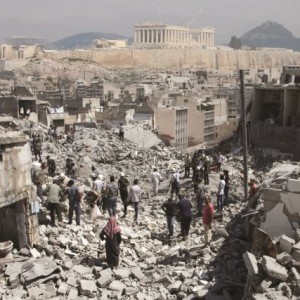Biennal : 6 / Thessalonique
|
Du 24/11/2017 au 27/11/2017 l’Atelier de Dessin organise un voyage pédagogique à Thessalonique pour la visite de la 6ème Biennal d’Art Contemporain. « Imagined homes » The Thessaloniki Biennale of Contemporary Art, first inaugurated in 2007, is organised by the Greek State Museum of Contemporary Art and has assumed the responsibility of bringing together Thessaloniki’s various artistic sectors while simultaneously providing a further international voice Home, as an imagined construct, constitutes the thematic core of the 6th Thessaloniki Biennale. The terms “hearth” (hestía) and “home”, here refer to notions not only of residence, but also of community and homeland, a place where one feels safe and accepted, has one’s roots, and develops the core of one’s social and family relationships. Today, however, for much of the world the above notions are uncertain, with thousands of people obliged to leave their homelands for other, hopefully safer, places. These notions therefore exist only within the imaginary, as constructs, projections and expectations. Taking today’s increasing immigrant influx as its starting point, the 6th Thessaloniki Biennale focuses on the fluidity and continuous redefinition of the notion of “home”. The topics upon which the research and formation of the artistic, educational, and exhibition programs are based are therefore: the contemporary diaspora; identities; the emerging feelings of familiarity; new practices of assimilation, acceptance, and co-existence that correspond to alternative understandings of gender, religion, family, and community in the widest sense possible.
|
 to Greece’s artistic scene. Although tested by the current social conditions and the downsizing of available financial resources, the 6th Thessaloniki Biennale is to be executed using the Museum’s own resources –its manpower and collaborative relationships– to take full advantage of the region’s existing cultural capital, as well as the wealth of Thessaloniki’s architectural heritage. The core aspiration of the 6th Biennale is to cultivate a model of co-curation, to diffuse contemporary art throughout the city, and to utilise synergies in Greece and abroad.
to Greece’s artistic scene. Although tested by the current social conditions and the downsizing of available financial resources, the 6th Thessaloniki Biennale is to be executed using the Museum’s own resources –its manpower and collaborative relationships– to take full advantage of the region’s existing cultural capital, as well as the wealth of Thessaloniki’s architectural heritage. The core aspiration of the 6th Biennale is to cultivate a model of co-curation, to diffuse contemporary art throughout the city, and to utilise synergies in Greece and abroad.
